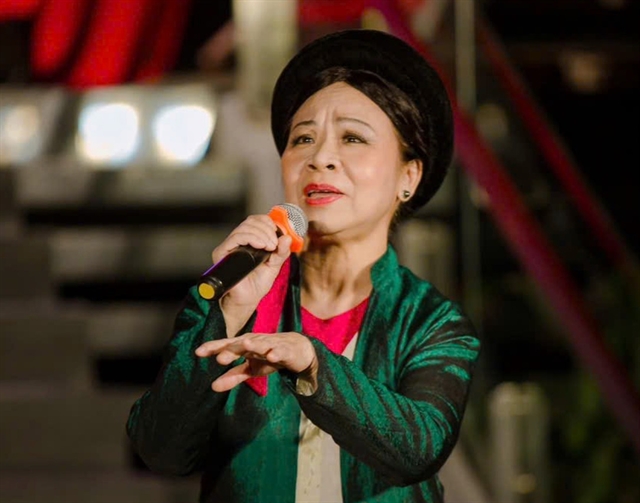 Inner Sanctum
Inner Sanctum

" />Vulcan Augmetics, a start-up that produces modular, affordable prosthetics, has won the first Việt Nam Blue Venture Award, which honours social entrepreneurs who aspire to make a positive change in society and spread the message that a company can both do business well and create a social impact. Thu Ngân asked Trịnh Khánh Hạ, general manager of the company, about its plans.
 |
Vulcan Augmetics, a start-up that produces modular, affordable prosthetics, has won the first Việt Nam Blue Venture Award, which honours social entrepreneurs who aspire to make a positive change in society and spread the message that a company can both do business well and create a social impact. Thu Ngân asked Trịnh Khánh Hạ, general manager of the company, about its plans.
Inner Sanctum: Your company has won the Blue Venture Award. Can you tell us something about it? How did the idea of making modular prosthetics come to you?
It has been an extraordinary journey for us since the day Vulcan was founded one year ago until the day we won the Blue Venture Award and became the first Vietnamese start-up to participate in the global award for social enterprises.
What that means is we’ll represent Việt Nam and go to London in May 2019 and compete with 20 other winners from England, Israel, Japan, the USA, and other countries for the US$1 million prize.
The idea of making affordable prosthetics actually came from two expat founders of ours: Rafael Masters and Akshay Sharma.
It happened that Masters grew up in the UK near the biggest college for disabled people in the country. So he has always seen that disabled people have a lot of untapped potential which can be unleashed with technology, and later on in his time in Việt Nam he became involved in the maker and robotics community. He saw that the existing prosthetics and mobility aid solutions were not solving problems relative to Việt Nam, and that the technology and skills already existed locally to provide a much better product that would work for developing countries and meet people’s real needs.
Masters then met Sharma, a talented electronics engineer from India with impressive experience in robotics and technology innovation, and they decided to pool their skills to create “the android of prosthetics”, a product and system that would take a difficult product and make it affordable, and as adaptable as the wearers themselves. And so Vulcan was born.
Inner Sanctum: How does your company expect to create positive changes in the community?
We expect to put literally hundreds of thousands of people back into the workforce, giving them independent, self-sustaining livelihoods. We will use our Uplift programme to get dozens of amputees back in public and into the workforce over the next year, in service positions which will help change the public’s perception of amputees and disabilities. We expect to change how the world sees Việt Nam: not as a poor war-torn country, but as one of Southeast Asia’s tiger economies with strong tech skills and the ability to push the envelope on human hardware. We expect to make the Vietnamese proud of their country’s technological skills and achievements and their place in Asia and the world.
Inner Sanctum: How do you prepare for the international competition in May?
To prepare for the global competition, personally I don’t have much to figure out. I was lucky to have significant experience studying and working in a competitive international environment, and already possessed the skills to pitch and the industry knowledge to share with others in a powerful way.
As a team, we need to work harder towards launching our first robotic arm – Vulcan Model VI – in the market in March to gain market validation by the time we go to London for the global competition. We’re also thinking about making a limited-version design for the robotic arm which will reflect the Vietnamese spirit entering this global competition.
Inner Sanctum: Most start-ups choose the traditional path, that of making profits. Why did your company decide to work for the community?
The two are not mutually exclusive; you can do both at once. In fact, working for the community sustainably requires that you make money and show profit to expand and scale up. We make money by helping people help themselves, and as they improve their own lives and income they come back to us and we make more profit. We make money when our users make money, which is why it is called a social enterprise, not a social charity. Social change has to be sustainable, and a profit making system is also more efficient in resource distribution to ensure we reach and help the maximum number of people. For us any social impact project has to be self-sustaining and able to expand, which requires income and a small surplus of profit to reinvest in the company’s goals.
Inner Sanctum: Vulcan wants to help 30 million people living with disabilities in Việt Nam get jobs. How do you plan to achieve this?
Well, for a start we plan to help around 300,000 people in Việt Nam and 38 million globally. We plan to do this by expanding aggressively, being very accessible and interactive online, by using existing networks to get the product out there as quickly as possible, and by using our Uplift programme to show people that their prosthetic is not just a visual band-aid, but a tool to improve their income.
The first step is our Uplift programme, where we work with local partners to put 30 prosthetics on 30 amputees, and get them jobs in local cafes and restaurants, using some special attachments we will make for each job.
We intend to show Việt Nam and the world that being an amputee is not something to be embarrassed about, that they can look good and work as well as anyone else, if not better. We are launching this with local corporations and partners as part of their corporate social responsibility activities and want to expand the programme over the next year.
We are partnering with local clinics, reaching out to local and regional hospitals and NGOs as well as directly to our users. We will engage with users by providing an online platform to allow them to make and track purchases, oversee maintenance, connect with clinics, and get assistance. We will streamline and make transparent the whole process and pricing system for all stakeholders, and will be aggressively marketing and pushing for foreign investment and expansion into Indonesia and India.
Inner Sanctum: As a social start-up yourself, what do you think are the challenges a social entrepreneur faces in Việt Nam?
The largest one is that people confuse social enterprises with charities, and are therefore reluctant to invest. We are here to offer products at an affordable price to those who need it, but we are also here to make money and become Việt Nam’s premier hardware-tech company.
A lot of people hear the words social enterprise and assume that it means no profit, whereas what it actually means is that we provide products and services that help the community and invest a minimum of 51 per cent of all profit back into developing the company. We want to change the world, but we want to do so sustainably, which in business terms means income. Other challenges include building a brand associated with quality whilst operating in the social impact environment. VNS




